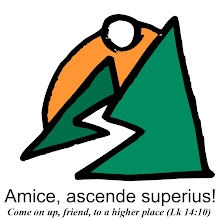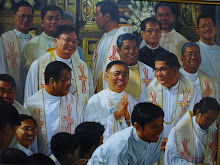In-Spiration and Con-Spiration Right from the Start
The image of God breathing on “chaos” (“formless wasteland” in NAB), is seen as God creating human life and calling to existence all the rest of creation. The account makes use of a fundamental meaning-laden metaphor in biblical creation theology. This first account of creation refers to “a mighty wind [that] swept over the waters” (Gen 1:1-31). The second account, equally poetic and symbolic, refers more directly to this creative In-Spiration (breathing act) of God: “The Lord God formed man out of the clay of the ground, and blew his nostrils the breath of life” (Gen 2:7).
Divine In-Spiration, however, was not a one-sided event. Right from the start, God wanted his first living creatures to have a complementary role in the ongoing process: “Be fertile and multiply; fill the earth and subdue it” (Gen 1:28); “The Lord God then took the man and settled him in the garden of Eden, to cultivate and care for it” (Gen 2:15).
Borrowing Haughey’s terminology (Gillespie, 2000), this Divine-Human con-Spiracy can be said to have begun at creation, and is a process that goes on till now.
The Call to Life as Process and Partnership
Scripture is clear about the nature of human life vis-à-vis the rest of the created world. Life is a gift that needs to be unwrapped, a call that needs to be answered daily. For humans, the world remains a place to be taken care of. Countless mysteries about life in this world still have to be “named,” and solutions to the riddle of sustainable and ecologically sound development of the earth that is our only home still await discovery. Unfortunately, now as before, humans have often been less than responsible, creating a mess of what Messer (1992) refers to as “world-havoc” instead of putting into place a “world-house,” engaging in wanton disregard of the breath of God that still “in-Spires” life from chaos, both natural and man-made. The original call to caring was replaced by selfish “possession.” The invitation to “mastery” turned out to be, in many cases, “abuse.” Self-less cooperation and partnership turned out to be sinful collusion, instead.
Re-appropriating the Tradition
Despite this, however, God continues to in-Spire order, truth, and wholeness into everything that is broken, chaotic, and sinful in our human lives as individuals and society. In and through Christ, the call continues and gradually becomes reality in the new life his dying and rising have wrought in us. Re-appropriating this creation spirituality leads us once more to the path of cooperation, as against the path of collusion; to the way of social responsibility, as against the way of selfish gain; to the way of solidarity in the good, instead of solidarity in evil.
This call to con-Spiracy, understood as engagement with the world and with others, and the Holy Spirit’s continually in-Spiring humanity to walk in solidarity with creation, with others, and with the Trinitarian God, leads to some disturbing realizations. For one, anyone deeply steeped in a spirituality characterized by cooperation, partnership, and solidarity, can never revert to a one based on personal, private, and selfish concerns. The Biblical injunction to “subdue the earth” no longer has connotations of wanton abuse of the earth’s resources without a corresponding sense of social responsibility. One realizes, furthermore, that everyone is called to cooperation. All are called to take part in this divine con-Spiracy toward personal and social transformation.
Beginning from the Home Front: Grace Building on Nature
In a very literal sense, the earth and the created world comprise a household given to our care. The same, however, is true with regard to my personal ongoing process of salvation in and through Christ. What is true for society is also true for me as an individual. For both, life is meant to be an on-going task-in-partnership. Christ’s call to “fullness of life” (Jn 10:10) is both a gift and a task to do in union with him. The grace of salvation needs to be met with human cooperation. This delicate interplay between God’s and man’s effort is partly what spirituality is all about.
This spirituality of partnership and collaboration leads me now to confront certain elements within me that stand in the way of full cooperation with God and with others. As an introverted personality with some narcissistic features (as do many of us clergy and religious), who still grapples with some self-esteem issues, collaborative ministry (Sofield & Juliano, 2000) is something I still need to develop. The grace that comes from ordination to ministry, understood as springing from, and flowing back to the community, finds a reluctant partner in me. Nature, thus, poses an obstacle to efficacy in ministry. The full flowering of the in-Spiration from the Holy Spirit cannot take place with said unredeemed parts of my nature still holding sway. Grace cannot build on a nature that continues to rebel, that continues to hold on to a misguided appropriation of a tradition that sees holiness and ministry as merely personal pursuits. Becoming a con-Spirator with the Spirit, and with other Spirit-led people, gets stalled, unless I allow grace and nature to come to a healthy interplay as they meet at the crossroads that is my life here and now, and in the days to come.
References:
Gillespie, C.K. (2000). Spiritual conversation groups: Con-Spiring with the Spirit. In Wicks, R. (Ed). Handbook of spirituality for ministers: Perspectives for the 21st century. Volume 2. New York: Paulist Press.
Messer, D. (1992). A conspiracy of goodness: Contemporary images of Christian mission. Nashville: Abingdon Press.
Sofield, L. & Juliano, C. (2000) Collaboration: Uniting our gifts in ministry. Notre Dame, IN: Ave Maria Press.
USCCB & NCCB (1987). The new American bible. South Bend, IN: The Green Lawn Press.


No comments:
Post a Comment